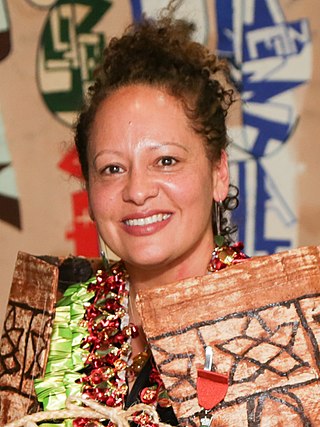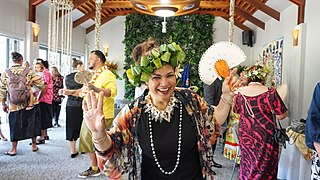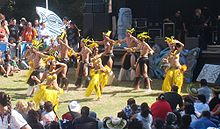Reed Publishing (NZ) Ltd was one of the leading publishers in New Zealand. It was founded by Alfred Hamish Reed and his wife Isabel in 1907. Reed's nephew Alexander Wyclif Reed joined the firm in 1925. It was a New Zealand literature specialist and general titles publisher, releasing over 100 titles a year including a number of significant New Zealand authors such as Barry Crump, Janet Frame and Witi Ihimaera.
Michael "Michel" Cliff Tuffery is a New Zealand artist of Samoan, Tahitian and Cook Islands descent. He is one of New Zealand's most well known artists and his work is held in many art collections in New Zealand and around the world.

Donna Tusiata Avia is a New Zealand poet and children's author. She has been recognised for her work through receiving a 2020 Queen's Birthday Honour and in 2021 her collection The Savage Coloniser won the Mary and Peter Biggs Award for Poetry at the Ockham New Zealand Book Awards. The Savage Coloniser and her previous work Wild Dogs Under My Skirt have been turned into live stage plays presented in a number of locations.

Auckland is a large metropolitan city in the North Island of New Zealand. It has an urban population of about 1,531,400. It is located in the greater Auckland Region, the area governed by Auckland Council, which includes outlying rural areas and the islands of the Hauraki Gulf, and which has a total population of 1,798,300 as of June 2024. It is the most populous city of New Zealand and the fifth largest city in Oceania. While Europeans continue to make up the plurality of Auckland's population, the city became multicultural and cosmopolitan in the late-20th century, with Asians accounting for 34.9% of the city's population in 2023. Auckland has the fourth largest foreign-born population in the world, with 39% of its residents born overseas. With its sizable population of Pasifika New Zealanders, the city is also home to the largest ethnic Polynesian population in the world. The Māori-language name for Auckland is Tāmaki Makaurau, meaning "Tāmaki desired by many", in reference to the desirability of its natural resources and geography.

Karlo Estelle Mila is a New Zealand writer and poet of Tongan, Pālagi and Samoan descent. Her first collection, Dream Fish Floating, received the NZSA Jessie Mackay Award for Best First Book of Poetry in 2006 at the Montana New Zealand Book Awards. She has subsequently published two further poetry collections, A Well Written Body (2008) and Goddess Muscle (2020), the latter of which was longlisted for the Mary and Peter Biggs Award for Poetry.

The Pacific Music Awards are an annual New Zealand music award ceremony since 2005 that honours excellence in Pacific music in New Zealand. The awards honour musicians who primarily work in the Pacific Island style of music from the Cook Islands, Fiji, Niue, Samoa, Tonga, Tokelau or Tuvalu, and also in urban and gospel genre categories.
Daren (DK) Kamali is a Fijian-born New Zealand poet, writer, musician, and teacher and museum curator.
Mīria George is a New Zealand writer, producer and director of Māori and Cook Island descent. Best known for being the author of award-winning stage plays, George has also written radio, television and poetry, and was one of the film directors of the portmanteau film Vai. In November 2005, she won the Emerging Pacific Artist's Award at the Arts Pasifika Awards. Mīria George was the first Cook Islands artist to receive the Fulbright-Creative New Zealand Pacific Writer's Residency at the University of Hawai'i.
Courtney Sina Meredith is a New Zealand poet, playwright, and short story author.

Nina Nawalowalo is a New Zealand theatre director and co-founder of the contemporary Pacific theatre company The Conch. She is known for directing the stage plays Vula and The White Guitar. The first film she directed A Boy Called Piano - The Story of Fa'amoana John Luafutu (2021) won 2022 Montreal Independent Film Festival Best Feature Documentary.

Counties Manukau are a New Zealand professional rugby union team based in Pukekohe, New Zealand. The union was originally established in 1955, with the National Provincial Championship established in 1976. They now play in the reformed National Provincial Championship competition. They play their home games at Navigation Homes Stadium in Pukekohe in the Auckland region. The team is affiliated with the Chiefs Super Rugby franchise. Their home playing colours are black, white and red.
Alamanda Lolo Motuga is a professional rugby union player who plays as a flanker for Super Rugby club Moana Pasifika. Born in New Zealand, he represents Samoa at international level after qualifying on ancestry grounds.

Phylesha Brown-Acton is a Niuean fakafifine LGBTQ+ rights activist. In 2019, she was appointed a Member of the New Zealand Order of Merit to recognize her work with LGBTQ+ communities from the Pacific countries.
Joana Monolagi is a Fijian artist and masi maker, whose work is in the collection of Auckland Art Gallery. She was awarded the Pacific Heritage Art Award in 2015 at the Arts Pasifika Awards, recognising her work in supporting art and culture, her role as Fijian coordinator for the Pasifika Festival, and her own unique artistic practice. She is part of The Veiqia Project arts collective.

FAFSWAG is an arts collective of Māori and Pacific LGBTQI+ artists and activists founded in Auckland, New Zealand in 2013. They explore and celebrate the unique identity of gender fluid Pacific people and LGBTQI+ communities in multi-disciplinary art forms. In 2020 FAFSWAG was awarded an Arts Laureate from the New Zealand Arts Foundation, and they also represented New Zealand at the Biennale of Sydney.
Kulimoe'anga Stone Maka, is an interdisciplinary artist of Tongan heritage who lives in Christchurch, New Zealand. In 2011, he was awarded the Emerging Pasifika Artist Award from Creative New Zealand. Maka's work has been exhibited in museums and art galleries in New Zealand, Hawai'i Australia and Tonga. In 2020 he was selected to represent New Zealand at the 22nd Biennale in Sydney.

Amanaki Lelei Prescott-Faletau is an actor, writer, dancer, choreographer, producer and director of Tongan descent, living in New Zealand. As a playwright, she became the first fakaleitī to have her work published in New Zealand with Inky Pinky Ponky. This play was awarded Best Teenage Script (2015) by New Zealand Playmarket. As an actor, she was awarded best performance at the 2015 Auckland Fringe Festival for Victor Rodger's Girl on the Corner. Her acting credits include The Breaker Upperers (2018), SIS (2020), The Panthers (2021), The Pact (2021) and Sui Generis (2022), in which she is also a writer for the TV series. Faletau competed as a dancer in the World Hip Hop Dance Championships in 2011 and has been a judge at the National Hip Hop Championships in New Zealand over several years.

Pasifika New Zealanders are a pan-ethnic group of New Zealanders associated with, and descended from, the indigenous peoples of the Pacific Islands outside of New Zealand itself. They form the fourth-largest ethnic grouping in the country, after European descendants, indigenous Māori, and Asian New Zealanders. Over 380,000 people identify as being of Pacific origin, representing 8% of the country's population, with the majority residing in Auckland.
Polyfest is an annual secondary school performing arts festival celebrating Polynesian culture held in Auckland, New Zealand. It was founded in Ōtara in 1976 and is now one of the largest Polynesian festivals in the world. The festival includes a performing arts competition between secondary school students.
Noma Sio-Faiumu is an event producer and arts manager of Samoan descent based in Onehunga, New Zealand. She has worked for over 30 years as an arts administrator within the New Zealand arts industry. Her work is cross-cultural and spans a wide social spectrum facilitating multidisciplinary art projects independently and for leading arts organisations. Within arts administration, Sio-Faiumu served as the lead facilitator for the APO Remix the Orchestra for a decade. The show received an International Music Council Musical Rights Award from the United Nations in 2013. Within the New Zealand music industry she is a founding member of the Pacific Music Awards (2005). She received a Special Recognition Award at Creative New Zealand's Pasifika Arts Awards for her contributions within the Pacific community (2017).













